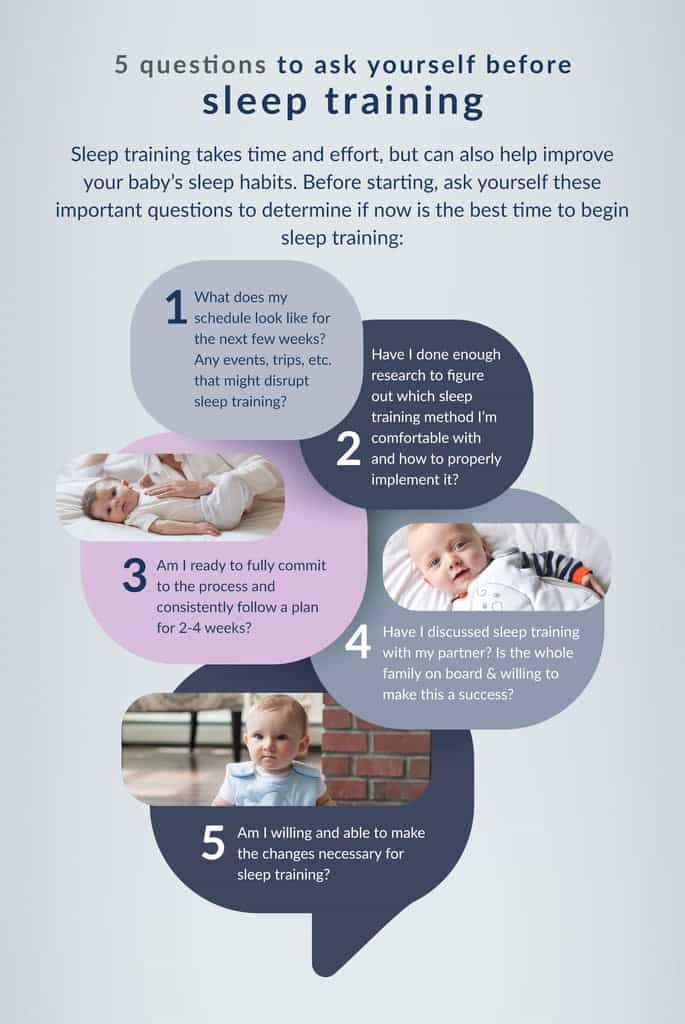When to Start Sleep Training Your Newborn: A Parent’s Guide
Introduction to Sleep Training for Newborns
Hey there, super-parents! Are you dreaming of uninterrupted nights and blissful slumbers? Well, you’ve navigated to the right corner of the internet! In this handy guide, we’ll explore the wonders of sleep training and pinpoint that “just-right” timing to start guiding your little starlight into a routine that lets the entire family catch those precious zzz’s.
Understanding Sleep Training: A Quick Overview
Before we dive into the “when,” let’s have a quick chat about what sleep training really entails. It’s a process aimed at helping your baby learn to fall asleep independently and snooze soundly through the night. There are various techniques from the gentle “no-tears” methods to the more structured “cry-it-out” strategies, but don’t worry, we’ll cover the options that resonate with your parenting style as you continue reading.
The Ideal Timing: When to Begin
So, when to start this nighttime voyage? While some experts suggest 4 to 6 months as the golden window, it’s crucial to assess both your child’s development and your family’s readiness. This perfect moment, dear parents, hinges on your baby’s ability to self-soothe and the environment you can provide for a consistent routine.
Pay Attention to Baby’s Sleep Cues
Hone your super-parent skills by observing your little one’s sleep patterns and cues. Is your baby starting to develop a somewhat predictable sleeping rhythm? Are they giving you signs that they’re ready to sail solo into dreamland? Knowledge of your baby’s unique habits is your secret superpower here!
Consult with Your Pediatrician
Before you start, a superhero alliance is a must – team up with your child’s pediatrician to ensure that your baby is growing beautifully and that sleep training is appropriate for their age and development. This professional sidekick will guide you through your baby’s milestones and offer seasoned insights into when your child might be ready for sleep training.
Assess Your Baby’s Development and Readiness
- Physical maturity: Typically, at around 4 months, many infants are capable of sleeping for longer stretches at night. However, each little munchkin is unique, and yours might be ready a touch earlier or might benefit from a bit more patience.
- Self-soothing abilities: Some newborns start to develop self-soothing skills as early as 2 months. These are the budding signs of possibly being ready for sleep training.
- Health check: Always ensure that your baby is in tip-top health. Address any concerns such as reflux, sleep apnea, or frequent ear infections before embarking on sleep training.
Setting Up for Sleep Training Success
Before you start, there’s some prep work to do! Establish a calming bedtime routine – a bath, a snuggle, a story. Make your baby’s sleep space comfy and safe: a firm mattress, no loose bedding or stuffed animals, and keep the room comfortably cool.
Methods of Sleep Training That Parents Love
Whether you’re a fan of the gentle ‘Ferber method’ or intrigued by ‘Fading’, choosing a sleep training technique that gels with your family’s philosophy is key. Some parents love the structure that comes with ‘Extinction’, while others prefer ‘Chair’ that offers a soft approach. But don’t fret; this guide will walk you through the choices so you can make an informed decision.
Becoming a pro at sleep training requires an abundance of patience, a sprinkle of consistency, and heaps of love. Bear in mind, it’s not just about sounding the starter’s pistol at a certain month. It’s about syncing with your baby’s tempo and readiness for a good night’s sleep – and remember, it’s totally ok for this to be a slow and steady marathon rather than a sprint!
Stay tuned, as we’ll dive deeper into each sleep training method, how to choose the right one for your family, and common FAQ’s about sleep training your new bundle of joy. Because let’s face it, equipped with the right knowledge and tools, YOU, amazing parents, have the power to conquer the sleep training challenge and embrace the sweet, sweet victory of a well-rested household. Happy sleep training!

5 Essential Tips for Preparing to Sleep Train Your Newborn
Excited to get started on sleep training? A little preparation can go a long way! Understanding these five essentials will set the stage for a smoother transition into sleep training for both you and your beautiful baby:
Create a Consistent Sleeping Environment
A conducive sleep environment is vital. Your baby’s sleep area should be cool, dark, and quiet. Consider room-darkening shades and a white noise machine to create an ideal atmosphere. A consistent environment helps signal to your little one that it’s time for sleep, no matter the time of day.
Develop a Pre-Sleep Routine
Just as you cherish your pre-bedtime rituals, your baby will benefit from a soothing routine. Bath time, cuddles, lullabies, or a quiet story can all serve as signals that it’s time to wind down. Consistency is key, so whatever routine you choose, stick with it!
Monitor and Adjust Feeding Schedules
As your baby grows, their feeding needs will change. Adjusting feeding schedules to ensure they’re not too hungry or too full at bedtime can make a world of difference. Keep in mind that while sleep training, nighttime feedings may still be necessary, depending on your baby’s age and needs.
Observe and Learn Baby’s Sleep Signals
Some babies yawn, others rub their eyes, while some may get fussy. Learn to decipher your baby’s unique signals that sleepy time is near. Catching these cues and putting them to bed promptly can prevent overtiredness, making it easier for your baby to fall asleep.
Be Patient and Flexible
Not all babies are ready to sleep train at the same time, and not all methods work for every family. Be willing to try different approaches and adjust your strategies. Remember, patience, love, and consistency will be your best friends throughout this journey.
Key Takeaways for Embarking on the Sleep Training Adventure
Your voyage through the world of sleep training is about to begin, and while there’s no one-size-fits-all map, these preparatory steps can help you navigate those sometimes choppy waters of teaching your newborn to sleep independently:
- Being well-informed and prepared is half the battle won, so take the time to read and understand different sleep training methods.
- Make sleep a pleasant experience for your baby by creating a cozy and inviting sleep environment.
- A predictable bedtime routine can be wonderfully reassuring for your little one, setting the stage for a peaceful night.
- Respond to your baby’s needs with love and care, but also with consistency in your sleep training approach.
- Every baby and family is unique – flexibility in your sleep training plan will allow you to find the best fit for your individual circumstances.
Embarking on sleep training is a significant milestone in your parenting journey. Treat it as an opportunity to learn more about your baby’s needs and to forge an even stronger bond with your little one. Embrace the process with positivity, and trust that with time, your family will enjoy the numerous rewards of a good night’s sleep. So here’s to sweet dreams, peaceful nights, and a delightful new chapter for you and your baby. Let the sleep training voyage begin!
See more great Things to Do with Kids in New Zealand here. For more information see here
Disclaimer
The articles available via our website provide general information only and we strongly urge readers to exercise caution and conduct their own thorough research and fact-checking. The information presented should not be taken as absolute truth, and, to the maximum extent permitted by law, we will not be held liable for any inaccuracies or errors in the content. It is essential for individuals to independently verify and validate the information before making any decisions or taking any actions based on the articles.




